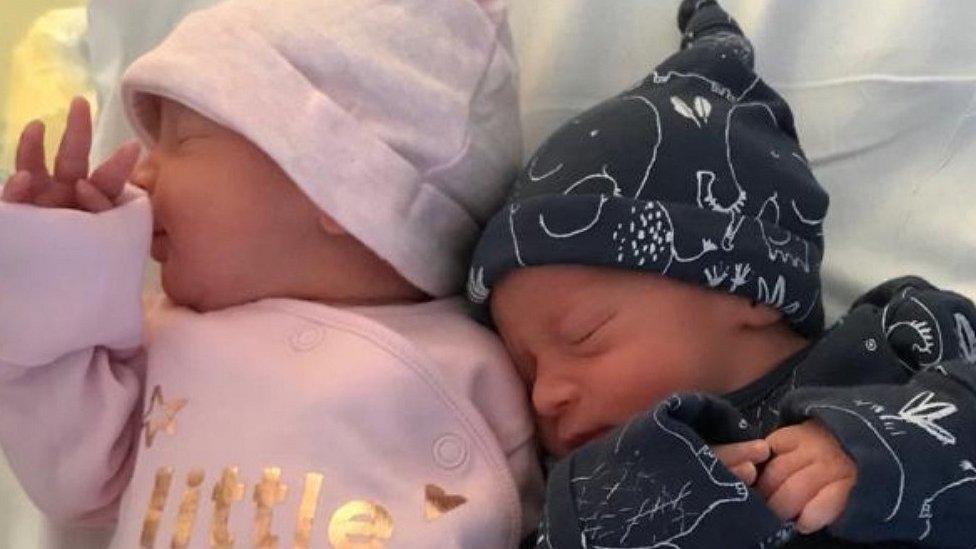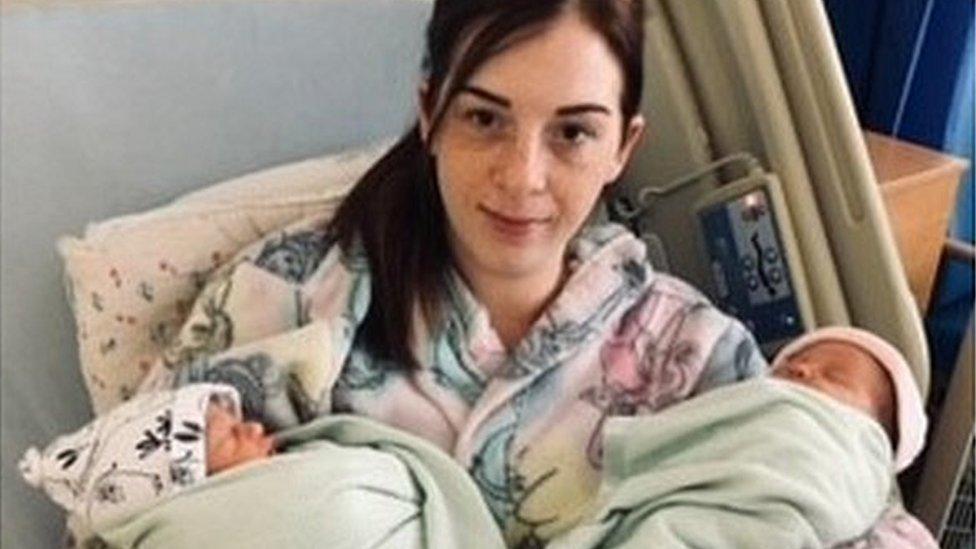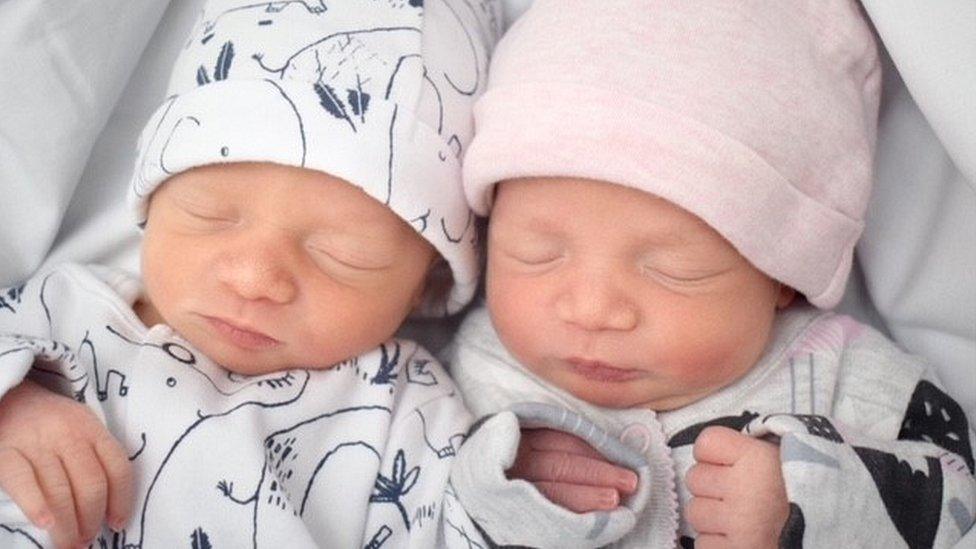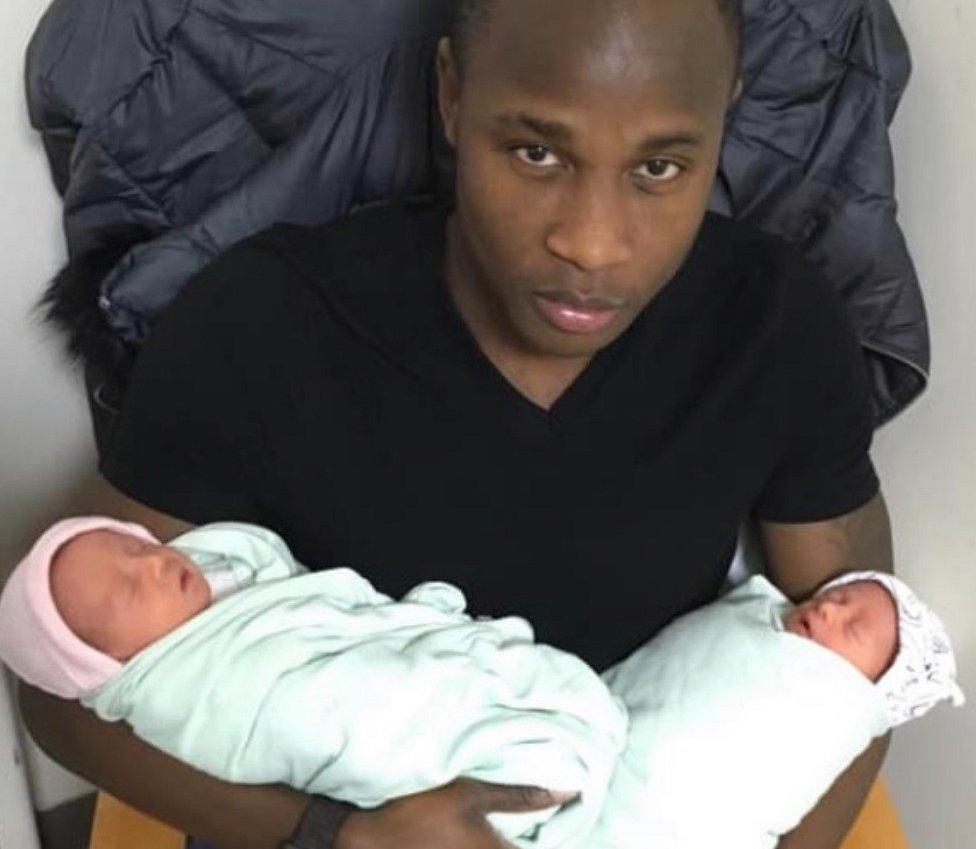Bolton Hospital care failures led to baby twin's death
- Published

Kingsley Olasupo (right) died 10 days after he and his twin sister were born
Systematic failures in hospital care contributed to the death of a premature baby twin, an inquest has concluded.
Kingsley Olasupo and his sister Princess were born prematurely at Royal Bolton Hospital in 2019.
While his sister was feeding well, Kingsley had a low birth weight and a low temperature.
He died at 10 days old from bacterial meningitis and sepsis but a coroner said he would have survived if antibiotics had been given earlier.
Coroner Peter Sigee said: "There were individual and systemic failures in the post-natal care of Kingsley, which meant he was not assessed and treated for infection in accordance with applicable guidelines.
"Taken both individually and together, these amounted to a gross failure to provide basic medical care to Kingsley and they were causative of his death."
Bolton NHS Trust said it was "truly sorry" that its care had fallen below standard and it had "made significant changes" to its practices.
Hospitals have since distributed new guidance, saying newborn babies should be given antibiotics within an hour of a serious infection risk being detected.
Kingsley's father Tunde Olasupo said: "We want Kingsley to be recognised and remembered as the baby who put new and better policies in place."
He added: "No amount of money in the world can ever replace Kingsley. Our only wish is that no one else goes through what we have and are failed the way Kingsley was."

The twins seen with their mother Nicola Daley
The hospital made an official apology to the babies' parents in March and agreed to pay an undisclosed amount of compensation, the family's representatives at JMW Solicitors said.
The twins were born prematurely at 35 weeks on 8 April 2019.
The inquest heard there was meconium - a baby's first stool - present when Kingsley was born and he also had a low birth weight, which are all considered infection risks.
However, the coroner concluded that a senior neonatal practitioner, who checked Kingsley within two minutes of birth, wrongly recorded there had been no meconium and did not escalate him for review by a doctor.
Details such as heart and respiratory rates were also not recorded.

The twins were born on 8 April 2019
Unlike his sister, Kingsley's feeding was poor and his temperature low over the first three days.
Under guidelines, this should have triggered an infection test but this did not happen until 12 April.
A midwife said she had not been made aware of the guidelines at the time and hospital procedures had changed considerably since Kingsley's death.
The inquest also heard the Newborn Early Warning System, which would have warned of the need for a test, was not generally in use on the ward at that time.
Another midwife said she had contacted the paediatrician to discuss her concerns about the baby's temperature but was told that she should put a sleep suit on him to "warm him up".
"I felt they should have come and checked the baby over," she said.
"I just felt if you have a concern and it's raised with a paediatrician, it should be acknowledged and acted upon."

The twins seen with their father Tunde Olasupo
On 12 April, Kingsley was diagnosed with bacterial meningitis and sepsis and a course of antibiotics was begun.
Nearly a week later, a brain scan showed he had developed brain damage which he could not survive.
His parents, from Bolton, were then informed that hospital medics could do nothing to save him and would not intervene if Kingsley developed difficulties with his airways.
This meant that, if they wished for the boy to die peacefully, they would have to agree to remove his life support.
He died from organ failure and swelling of the brain on 18 April.
'Significant changes'
Coroner Mr Sigee said he "should have been assessed by a paediatric doctor within two hours of his birth and every day thereafter".
Rachael Heyes, from JMW, said there had been "a lack of implementation of policies and a breakdown of communication".
She said: "It is imperative going forward that all maternity trusts ensure that midwives are trained on recognising risk factors for infection and are aware of the need for early review by a doctor if a baby's condition causes concern at any time."
A spokesman for Bolton NHS Trust said: "We fully accept the outcome of the inquest and are truly sorry that our care fell below the standards that Kingsley, Nicola and Tunde deserved.
"We undertook a thorough and transparent investigation, and have reviewed our practices and made significant changes.
"Babies who are at high risk of infection on our postnatal ward are monitored more closely by the right specialists in order to better detect early infection."

Why not follow BBC North West on Facebook, external, Twitter, external and Instagram, external? You can also send story ideas to northwest.newsonline@bbc.co.uk